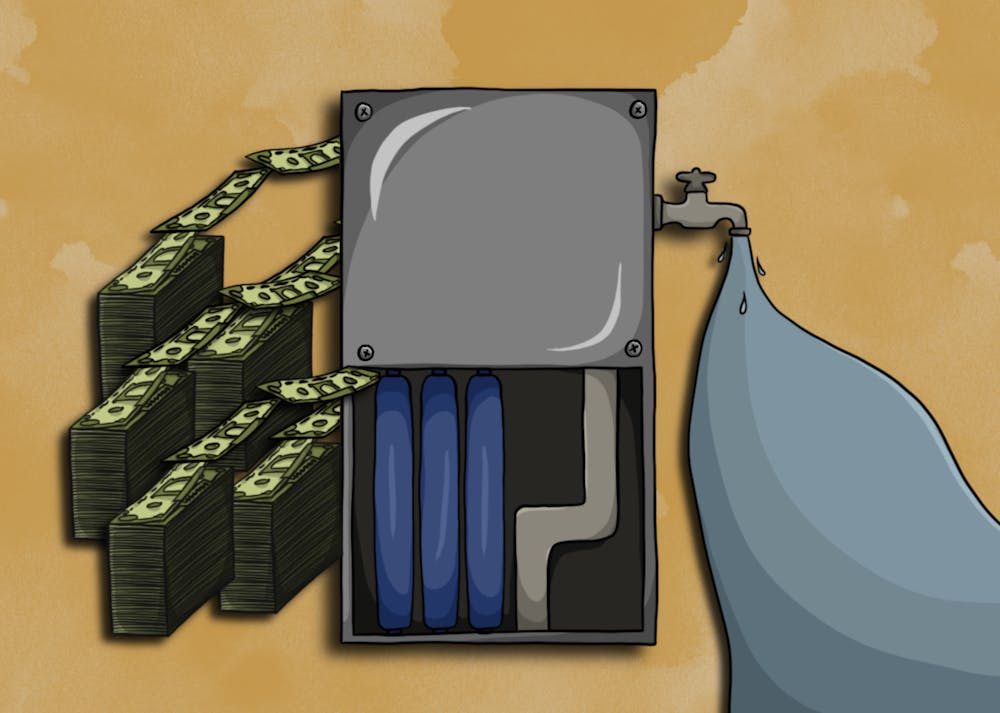Arizona's water future is unclear, but ASU is working to change that. Existing programs and schools at the University focusing on research and development could be key in finding the best set of solutions to the state's water crisis.
The dual threat of increased population and megadrought conditions due to climate change are not likely to ease in the near future. Drought conditions that have persisted in the West are considered to be the driest 22-year period since the year 800, a report from Nature Climate Change found.
Last month, Gov. Doug Ducey proposed a historic $1 billion investment in Arizona's water future, which could lead to seawater desalination plants in Mexico in the next decade.
"It's really critical for places like ASU, that have this great history of innovation and a great workforce — student body and faculty and researchers — who can be applied to this," said Sarah Porter, director for the Kyl Center for Water Policy. "That really is what Gov. Ducey, I think, is calling for."
Seawater desalination is a process that removes salt and other minerals from water for human consumption or for other reuse. Desalination plants have become more common in recent years as technology has improved. In his State of the State address, Ducey pointed to Israel as a model, a country that has been a world leader in creative water solutions and relies on desalination for over half of its domestic water supply.
Decisions about how best to make Arizona's water future more resilient are complex, and desalination is not a solution on its own. Arizona would likely need four new water sources to meet the projected demand, according to a 2020 binational report studying desalination opportunities on the Sea of Cortez, a body of water near Mexico.
ASU's strengths as an innovator and a research institution can have a significant "decision support" role in ensuring Arizona’s long-term water supplies are resilient, Porter said. The Kyl Center is part of the Morrison Institute for Public Policy at ASU.
If a desalination plant becomes part of the state's water portfolio, Arizona could partner with Mexico to build plants, and Mexico would take the water and pipe it to Morelos Dam, near Yuma. In exchange, Arizona would take 200,000 acre-feet of Mexico's Colorado River allocation.
READ MORE: Colorado River shortage spurs talks of water conservation
One acre-foot of water can supply "three fairly efficient homes for a year," said Porter.
"Arizona would be taking, with agreement of course, some of Mexico's allocation of Colorado River water and we would take it at Lake Havasu," Porter said. "Which is way upstream, where Arizona is already taking water to be delivered via the Central Arizona Project."
The Central Arizona Project is a 336-mile long system that is the state's largest resource for renewable water supplies. It serves more than five million people by moving water in aqueducts, canals and pipelines.
While there are some potential downsides, like high cost and environmental impacts, Porter believes desalination is a worthwhile consideration.
"Both sides need to look at this and a lot of questions need to be answered, but it's not bad to have a drought-proof water supply. It's not a terrible thing," Porter said.
Porter believes one of the best ways ASU can help is by using its Decision Theater, though the program hasn't launched any such desalination-focused modeling. The Decision Theater's Arizona CuRVE Project models the impacts of Colorado River climate, hydrology and management scenarios that trickle down to Arizona.
Decision Theater experts create software and visualizations in a number of disciplines in hard and social sciences for community stakeholders and policymakers to collaborate.
"Decision Theater is actually the integration of a variety of different capabilities," said Jon Miller, the program's director. "Real world problems, by their nature, are multidisciplinary. And that's what makes them so complex."
That data can be used to forecast the effects of different strategies for complex problems, Miller said. Problems like whether to build two desalination plants in Mexico.
A recent grant from the Virginia G. Piper Trust allocated $5 million dedicated to a Decision Theater project to provide cutting edge modeling of Arizona's water system, the CuRVE project. An additional $2 million has been awarded to expand and improve the Decision Theater from the state's Technology and Research Initiative Fund, which is funded by state sales tax revenue.
"When you look at the implications, not just for yourself but for everyone else, it changes how you think about the problem," said Keren Hirsch, who oversees the project management and operations teams at Decision Theater. "I think that's something that Decision Theater does really successfully, is your viewpoint is represented, but all of a sudden, you can see someone else's as well."
The integration of multiple models from different disciplines and perspectives is key. Porter said without a "great comprehensible way of presenting your modeling, it doesn’t have its intended effect."
Porter sees the potential of ASU experts from all corners of the University coming together to solve a state-wide problem with the help and funding from the state as something transformative.
"I'm impressed with the efforts so far, I really am, to pull people in the water community at ASU together, especially this focus on Arizona," Porter said, "It's right that ASU should turn its energy to where it is. It makes me very happy."
Reach the reporter at jdbrow52@asu.edu and follow @JamesBrownASU on Twitter.
Like The State Press on Facebook and follow @statepress on Twitter.

James Doyle Brown, Jr. is an opinion columnist at The State Press. He is also in his final semester as a graduate student studying investigative journalism at the Walter Cronkite School of Journalism and Mass Communication. He has previously reported for the State Press politics desk, The Howard Center of Investigative Journalism and Carnegie-Knight News21.




